Table of Contents
Get started with MyPerfectResume today!
- Build a resume on any device
- Pick an ATS-friendly template
- Tailor with AI copy suggestions
Why this resume works
- Quantifies accomplishments: Including measurable accomplishments, like diagnosing and repairing over 75 motorcycles weekly, the applicant effectively showcases their impact on efficiency and customer service.
- Showcases career progression: Starting as a bike maintenance specialist and progressing to mechanic roles, the applicant illustrates clear career growth by taking on increasing responsibilities and improving customer satisfaction.
- Uses action-oriented language: Using action verbs like “diagnosed,” “executed,” and “managed,” the applicant conveys initiative and effectiveness.
More Motorcycle Mechanic Resume Examples
Our motorcycle mechanic resume examples provide insights into showcasing your repair skills, troubleshooting expertise, and customer service. Use these mechanics resume samples to create a strong resume tailored for various mechanic roles.
Entry-Level Motorcycle Mechanic
Why this resume works
- Puts skills at the forefront: The applicant uses a skills-based resume format to place skills prominently on their resume, ideal for entry-level roles.
- Shows digital literacy: The inclusion of technical abilities like electrical systems troubleshooting shows digital readiness, aligning with computer skills needed in modern workplaces.
- Effective use of keywords: Strategic keywords, such as “engine diagnostics,” help the resume navigate applicant tracking systems effectively.
Mid-Level Motorcycle Mechanic
Why this resume works
- Points to measurable outcomes: By listing achievements like boosting service efficiency by 25% and cutting part costs by 15%, the applicant clearly showcases their impact in operational improvements.
- Demonstrates language abilities: Language skills in Spanish, French, and German indicate the applicant’s ability to improve their ability to connect with diverse clientele.
- Displays technical expertise: The resume emphasizes technical prowess through certifications like Certified Motorcycle Technician, showcasing a solid foundation in specialized repair techniques and diagnostics.
Experienced Motorcycle Mechanic
Why this resume works
- Focuses on work history: Using a chronological resume format, the applicant clearly outlines 15 years of diverse experience in motorcycle mechanics, showcasing a steady career progression.
- Showcases impressive accomplishments: Highlighted standout achievements such as reducing service costs by $3K monthly and boosting efficiency by 15%, reflecting senior-level performance with significant business impact.
- Lists relevant certifications: Relevant certifications, like Certified Motorcycle Mechanic from Automotive Service Excellence, show commitment to continuous learning and expertise.
Motorcycle Mechanic Resume Template (Text Version)
David Nguyen
Seattle, WA 98101
(555)555-5555
David.Nguyen@example.com
Professional Summary
Experienced Motorcycle Mechanic with 4 years of comprehensive expertise in engine diagnostics, mechanical troubleshooting, and customer service. Known for reducing costs and enhancing satisfaction.
Work History
Motorcycle Mechanic
Precision Torque Motors – Seattle, WA
August 2022 – August 2025
- Diagnosed and repaired 75+ motorcycles weekly
- Performed routine maintenance and inspections
- Increased customer satisfaction by 20% annually
Motorcycle Technician
Elite Bike Repairs – Spokane, WA
August 2020 – August 2022
- Executed engine rebuilds with precision
- Conducted diagnostic tests using advanced tools
- Managed inventory, reducing costs by 15%
Bike Maintenance Specialist
CycleWorx – Spokane, WA
August 2019 – August 2020
- Maintained and upgraded customer motorcycles
- Assisted in training new hires effectively
- Reduced repair times by 10% through innovation
Skills
- Engine Diagnostics
- Mechanical Troubleshooting
- Parts Replacement
- Customer Service
- Brake Systems
- Electrical Systems
- Preventative Maintenance
- Inventory Management
Education
Bachelor of Science Mechanical Engineering
University of California, Berkeley Berkeley, California
May 2019
High School Diploma
Lincoln High School San Francisco, California
May 2015
Certifications
- Certified Motorcycle Mechanic – Motorcycle Mechanics Institute
- Advanced Engine Diagnostics – Automotive Service Excellence (ASE)
Languages
- Spanish – Beginner (A1)
- Mandarin – Intermediate (B1)
- German – Beginner (A1)
Related Resume Guides
Advice for Writing Your Motorcycle Mechanic Resume
Discover how to write a resume tailored for a motorcycle mechanic role. Learn how to highlight your hands-on repair skills, knowledge of engine systems, and passion for keeping bikes road-ready.
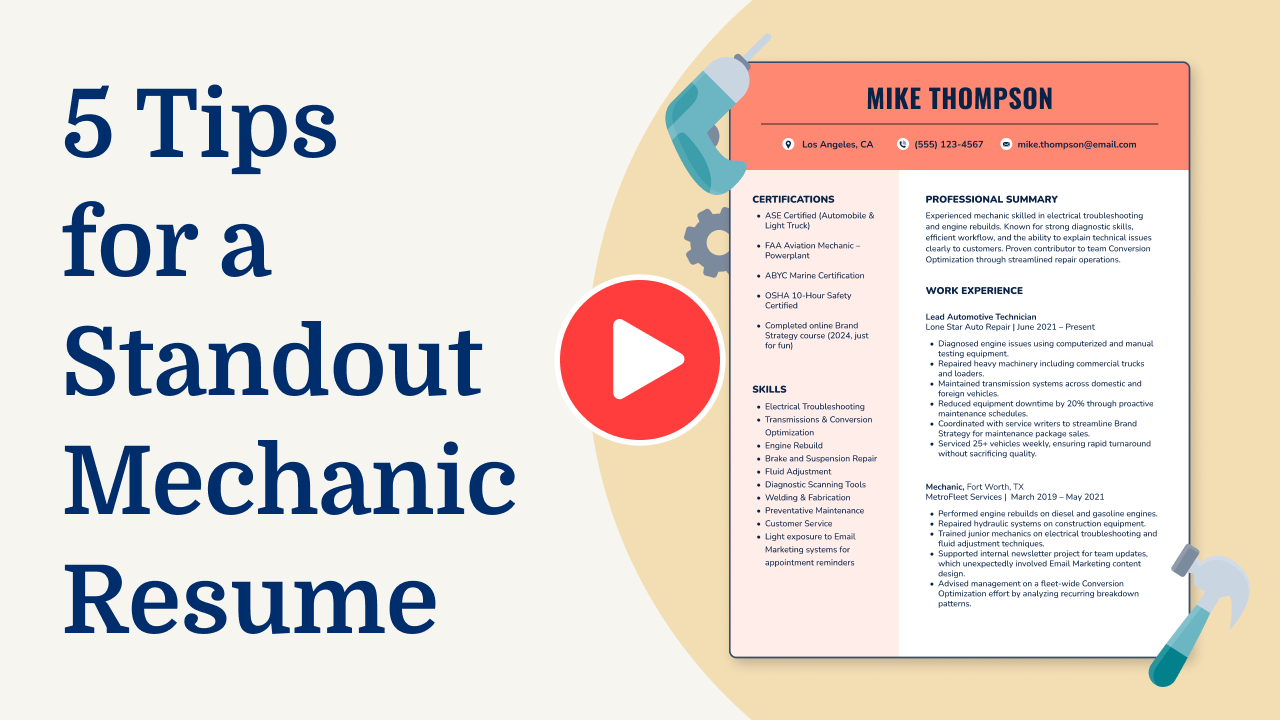
Highlight relevant technical skills
When you’re aiming for a job as a motorcycle mechanic, showcasing your technical skills is important. These skills demonstrate your ability to handle the hands-on tasks that are key to keeping motorcycles running smoothly.
Create a separate skills section on your resume to show employers what you can do and how you can contribute to their team. Alternatively, if you have relevant work experience, highlight these skills within the descriptions of past jobs. This highlights how you’ve applied your knowledge in real-world situations.
Some technical skills that motorcycle mechanics often need include engine repair, brake system maintenance, and electrical troubleshooting.
Diagnosing and fixing problems quickly is essential. Other useful abilities might involve familiarity with diagnostic tools or performing routine tune-ups to keep bikes in top shape. Understanding how different parts of the motorcycle work together also improves effectiveness at your job.
Remember, it’s not just about listing technical jargon; it’s about showing how these skills help you succeed as a motorcycle mechanic. Reflect on the tasks you’ve done before and use them to illustrate your expertise in this field.
Example of a technical skills section
- Motorcycle engine diagnostics and repair
- Fuel injection systems troubleshooting
- Electrical system analysis and wiring repairs
- Brake system servicing (hydraulic and disc brakes)
- Suspension setup and tuning
- Transmission repair (manual and automatic)
- Use of diagnostic tools (OBD scanners, multimeters)
- Carburetor cleaning and adjustment
- Tire mounting, balancing, and alignment
- Custom exhaust system installation
You can use our Resume Builder to craft a resume that highlights technical skills in addition to key soft skills like teamwork, communication, and adaptability.
Quantify your accomplishments
Quantifying accomplishments on a resume makes it more powerful by showing what you have achieved rather than just listing what you did. For a motorcycle mechanic, this means turning everyday tasks into measurable successes.
In the work experience section, start with your job title, the employer’s name, location, and employment dates. Then focus on achievements using numbers or percentages. For example, instead of saying you “fixed motorcycles,” say you “reduced repair time by 20% by implementing new diagnostic tools.” This helps employers see the direct impact of your work.
Using action verbs and metrics in your work experience entries creates a results-driven resume that stands out. Instead of stating duties like “performed maintenance checks,” quantify them: “conducted over 100 maintenance checks monthly, improving customer satisfaction scores by 15%.”
Such details help hiring managers quickly assess your skills and contributions to past employers. Quantified accomplishments paint a clearer picture of your abilities as a motorcycle mechanic and demonstrate how you can bring value to a new workplace.
5 motorcycle mechanic work history bullet points
- Performed comprehensive diagnostics and repairs on over 150 motorcycles annually, increasing customer satisfaction scores by 25%.
- Reduced service turnaround time by 30% through the implementation of a streamlined parts ordering process.
- Trained and mentored 3 junior mechanics, improving team efficiency and skill levels in complex repair tasks.
- Managed inventory for a busy workshop, achieving a 20% reduction in parts shortages and delays.
- Executed preventive maintenance plans for clients that decreased breakdown incidents by 40% over six months.
Need help starting your resume? Check out our professional resume examples to get ideas and make yours stand out.
Write a powerful professional summary
A professional summary on a resume serves as an introduction to hiring managers, helping them quickly grasp your qualifications and potential fit for the role. You can choose between writing a summary or an objective, depending on your experience level and career goals.
Typically three to four sentences long, a professional summary highlights your experience, skills, and achievements. A well-crafted summary emphasizes what you’ve already accomplished in your career. It’s ideal for experienced applicants like motorcycle mechanics who want to showcase their professional identity and the value they bring.
In contrast, a resume objective is a statement of career goals. It’s best suited for entry-level job seekers, those changing careers, or individuals with gaps in employment. While summaries focus on “what I’ve accomplished,” objectives highlight “what I aim to contribute.”
Next, we will provide examples of both summaries and objectives tailored for various industries and experience levels to help you craft an effective introduction suited to your background.
Motorcycle mechanic resume summary examples
Entry-level
Recently graduated motorcycle mechanic with a vocational diploma in motorcycle maintenance and repair. Holds certification from the Motorcycle Mechanics Institute (MMI) with foundational skills in engine diagnostics, basic electrical systems, and routine servicing. Eager to apply technical knowledge and learn advanced techniques in a dynamic workshop environment.
Mid-career
Experienced motorcycle mechanic with over seven years of hands-on experience in both dealership and independent garage settings. Proficient in complex engine rebuilds, performance tuning, and custom modifications. Celebrated for improving service efficiency by 20% at previous employer through streamlined diagnostic procedures and adept use of modern tools.
Experienced
Seasoned motorcycle mechanic with a decade-long career specializing in high-performance motorcycles and vintage restorations. Expertise includes advanced electronic troubleshooting, precision machining, and team leadership within a busy service department. Recognized for reducing turnaround times significantly while maintaining high customer satisfaction ratings.
Motorcycle mechanic resume objective examples
Entry-level
Detail-oriented recent graduate from an automotive technology program seeking to start a career as a motorcycle mechanic. Eager to apply hands-on training and technical knowledge in engine diagnostics and repair within a dynamic workshop setting, while contributing to team efforts and customer satisfaction.
Career changer
Passionate former retail worker transitioning into the motorcycle mechanic field, equipped with a strong mechanical aptitude and enthusiasm for learning new skills. Looking to leverage customer service experience and problem-solving abilities in an entry-level position where dedication to quality service and teamwork are valued.
Vocational training
Motivated individual with vocational training in motorcycle maintenance seeking an opportunity to join a reputable garage. Committed to using foundational skills in troubleshooting and repairs, while gaining further expertise under the guidance of experienced mechanics.
When choosing a resume template, opt for one with clear headings and simple fonts, avoiding overly complex designs to ensure your skills and experience are easy to understand.
Showcase your credentials
Listing certifications, licenses, and specialized training is very important for a motorcycle mechanic. These credentials show you have the skills needed to fix and maintain motorcycles safely and correctly.
A dedicated certifications section on your resume helps employers see your expertise right away. This can be put along with your education section to give a complete picture of your qualifications.
Here are a few examples of relevant certifications to include on your resume:
- Motorcycle Mechanics Institute Certification
- ASE Certified Motorcycle Technician
- Harley-Davidson University Training
- BMW Motorrad Technical Training
- Honda Pro Technician Program
Having these certifications makes you stand out as someone who knows what they’re doing in the motorcycle repair field. They also help build trust with potential employers because they know you’re trained by recognized programs. Listing these credentials prominently on your resume helps you get noticed and can lead to more job opportunities.
Example of a certifications section
Harley-Davidson Master Technician
Issued by: Harley-Davidson Motor Company
Expires 2025
Motorcycle Repair Technician Certification
Issued by: Motorcycle Mechanics Institute (MMI)
Issued 2021
ASE Certified Motorcycle Technician
Issued by: National Institute for Automotive Service Excellence (ASE)
Expires 2024
BMW Motorrad Service Technician
Issued by: BMW Group
Issued 2023
Ducati Service Certification
Issued by: Ducati North America
Expires 2026
Use a polished and professional resume format that aligns with your experience level to ensure your skills and qualifications stand out to hiring managers.
Salary Insights for Motorcycle Mechanics
Understanding salary data can help you make informed decisions about your career path and negotiation strategy. Explore key insights below to guide your research.
Top 10 highest-paying states for motorcycle mechanics
Motorcycle Mechanics earn varying salaries across the United States, with a national average of $48,711. The table below highlights the states where motorcycle mechanics command the highest compensation.
Our salary information comes from the U.S. Bureau of Labor Statistics’ Occupational Employment and Wage Statistics survey. This official government data provides the most comprehensive and reliable salary information for motorcycle mechanics across all 50 states and the District of Columbia. The figures presented here reflect the May 2025 dataset, which is the most recent available as of this publication.
| State | Average Salary |
|---|---|
| California | $58,290 |
| Maryland | $57,260 |
| Oregon | $56,480 |
| North Dakota | $56,350 |
| Massachusetts | $56,430 |
| Wisconsin | $55,530 |
| New Jersey | $55,380 |
| Alaska | $55,630 |
| New Hampshire | $54,240 |
| Wyoming | $53,630 |
FAQ
Do I need to include a cover letter with my motorcycle mechanic resume?
Including a cover letter with your motorcycle mechanic resume can give you an edge over other applicants by highlighting your skills and enthusiasm for the role.
A cover letter lets you explain why you’re passionate about working with motorcycles and how your experience aligns with the shop’s needs, such as expertise in engine repair or familiarity with specific bike brands.
If the employer specializes in custom builds or racing bikes, use the cover letter to emphasize relevant projects you’ve handled that demonstrate your expertise.
Tools like our Cover Letter Generator can help you quickly craft a tailored letter by pulling key details from your resume and offering structure and wording suggestions.
You can also check out various cover letter examples online to see how others have successfully highlighted technical skills and industry-specific experience.
How long should a motorcycle mechanic’s resume be?
For a motorcycle mechanic, a one-page resume is usually the best fit, especially if you’re early in your career or have less than 10 years of experience.
Focus on showcasing your technical skills, certifications, and hands-on experience with motorcycles to make a strong impression quickly.
If you’ve been in the field for many years or have specialized expertise—like working on high-performance bikes or custom builds—a two-page resume might be more appropriate. Just ensure that everything included is relevant and adds value to your application.
Take time to explore how long a resume should be based on your career stage. Keeping it concise while emphasizing recent accomplishments and key qualifications will help you stand out as an applicant.
How do you write a motorcycle mechanic resume with no experience?
When creating a resume with no experience, you can still effectively showcase your potential by highlighting skills and relevant training, making it appealing to employers. Here are a few tips to help you get started:
- Emphasize education: Start with any mechanical courses you’ve taken, whether in high school, vocational school, or online. Include the name of the institution, course titles, and completion dates.
- Highlight hands-on projects: If you’ve worked on personal projects like restoring a bike or helping friends with repairs, describe these experiences. Detail what you did and the tools you used to show your practical skills.
- List transferable skills: Skills such as problem-solving, attention to detail, and manual dexterity are important for a mechanic. Mention any part-time jobs or volunteer work where you developed these abilities.
See our guide on writing a resume with no experience for more detailed advice on crafting a resume specifically tailored to entry-level motorcycle mechanic positions.
Rate this article
Motorcycle Mechanic
Share this page
Additional Resources
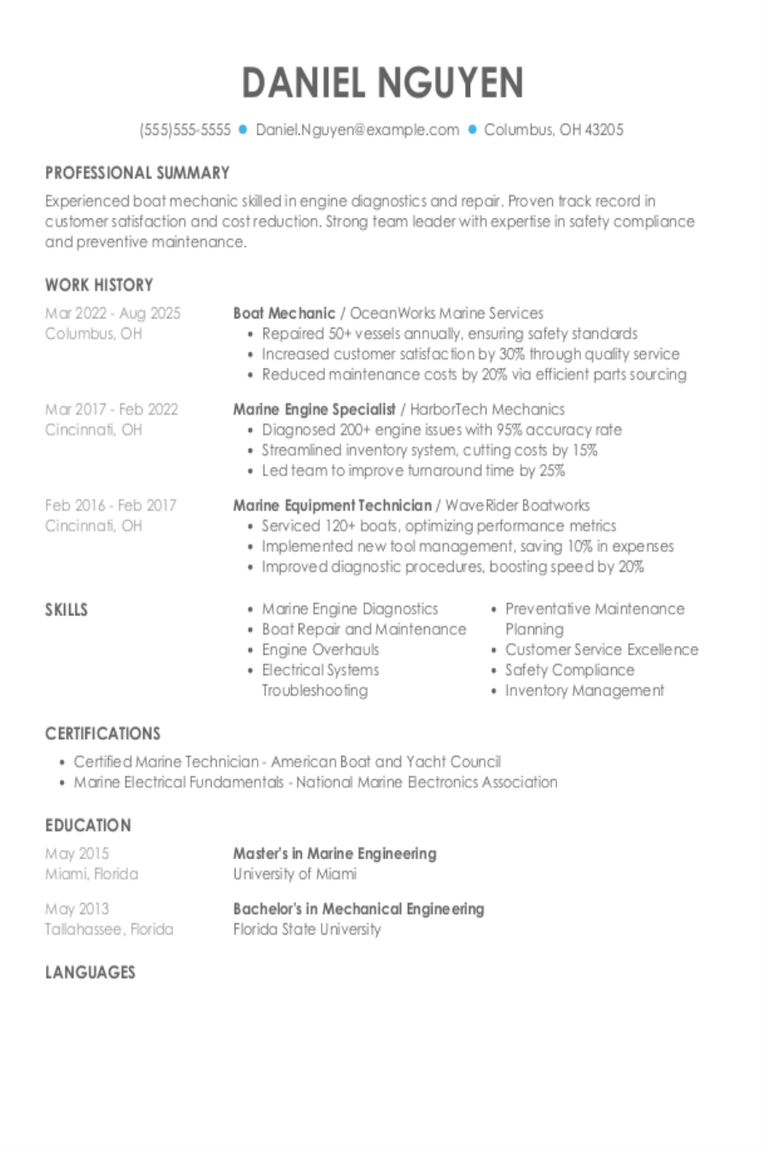
Boat Mechanic Resume Examples & Templates
Explore boat mechanic resume examples to see how to highlight experience fixing engines, diagnosing problems, and doing regular maintenance. Discover tips to showcase your skills in keeping boats running smoothly
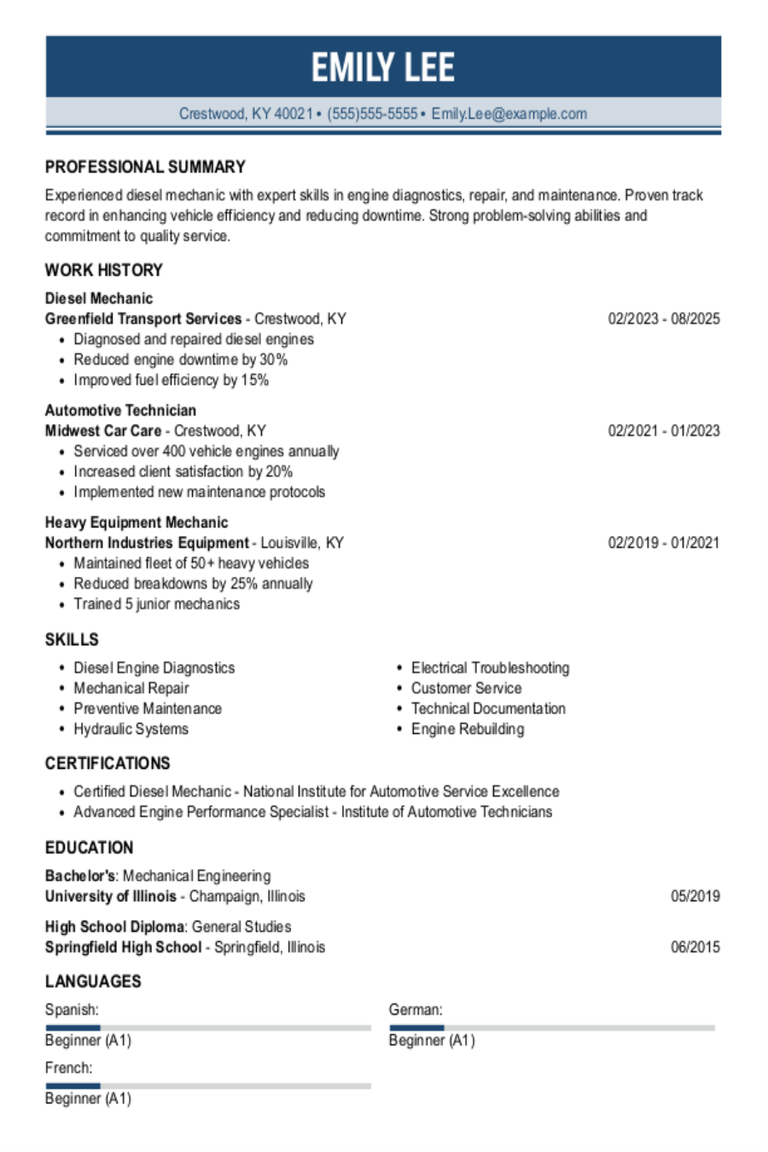
Diesel Mechanic Resume Examples & Templates
Explore diesel mechanic resume examples to see how to list repair skills and experience working with heavy equipment. Use these samples and tips to share hands-on experience that stands out
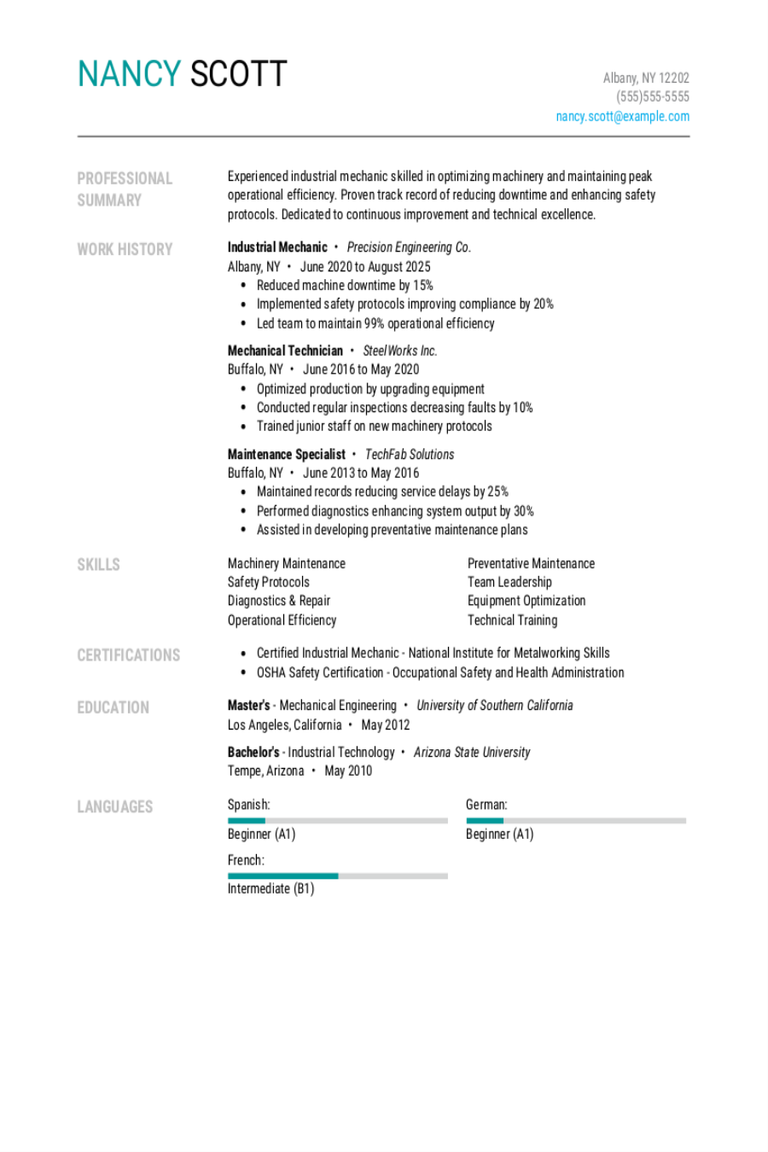
Industrial Mechanic Resume Examples & Templates
Explore how industrial mechanics highlight fixing machines and keeping equipment running smoothly on their resume. These examples and tips show you how to make your skills and experience shine on
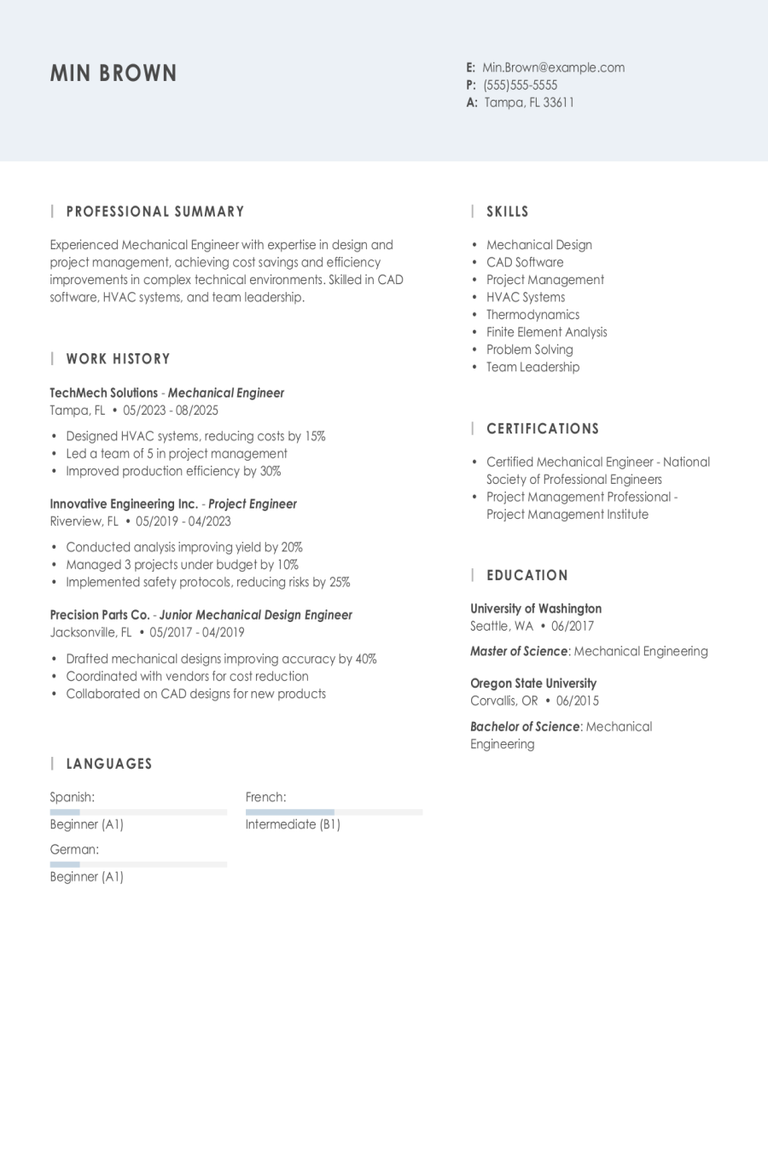
Mechanical Engineering Resume Examples & Templates
Explore mechanical engineering resume examples that show you how to highlight design skills, problem-solving abilities, and experience with machines. Learn to showcase your role in creating efficient systems and improving
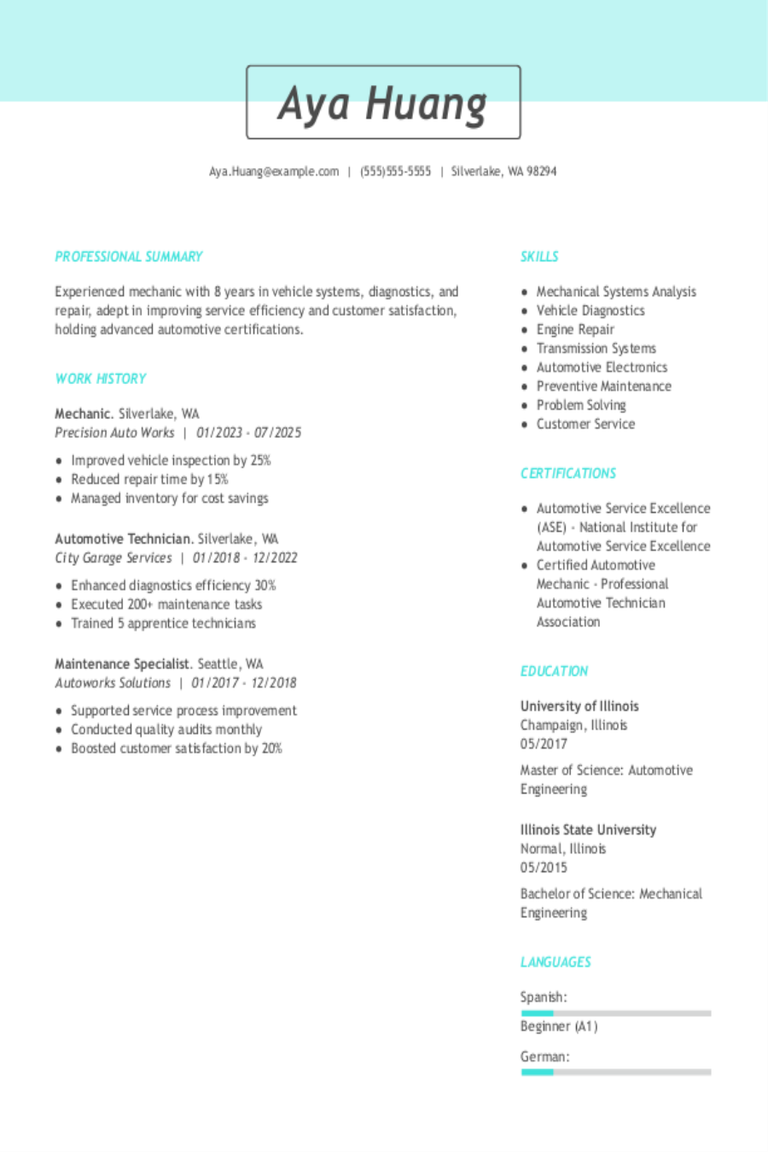
Mechanics Resume Examples & Templates
Discover mechanic resume examples to see how to showcase your hands-on skills and repair experience. Learn how to highlight your expertise in fixing vehicles and impress auto shops looking for
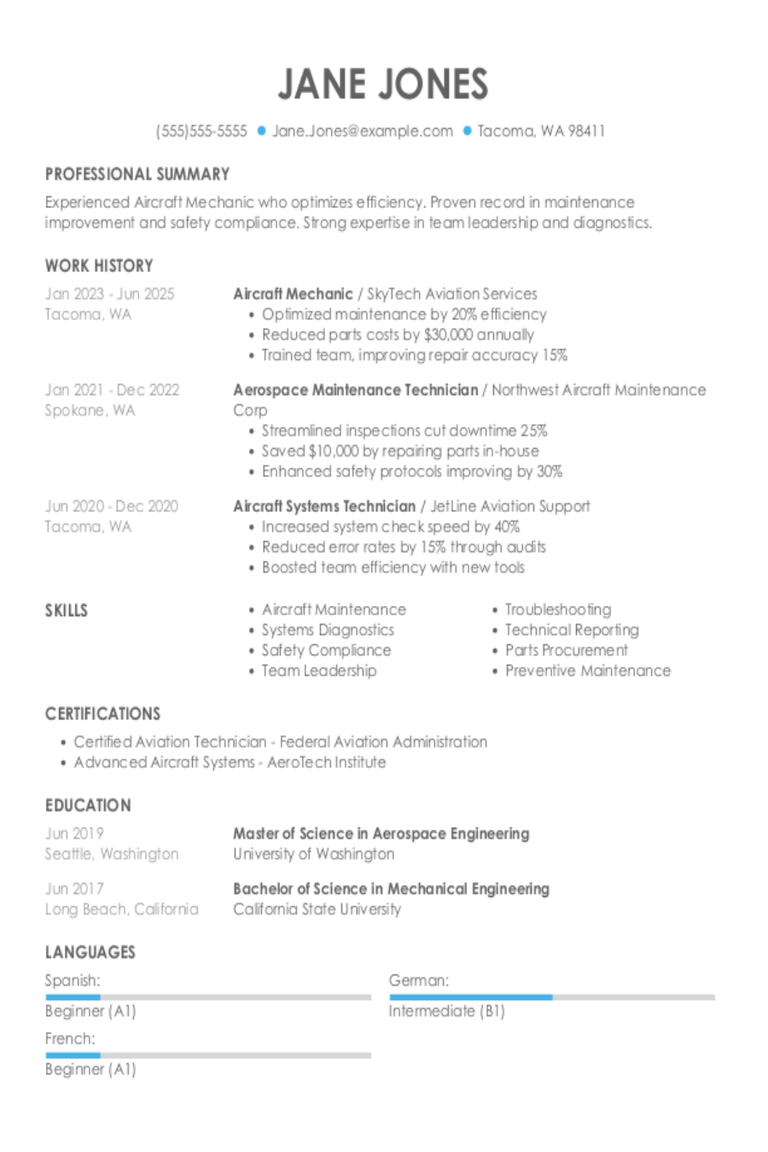
Aircraft Mechanic Resume Examples & Templates
Explore aircraft mechanic resume examples that highlight experience fixing and maintaining airplanes safely. Get tips for showcasing your repair skills and relevant experience.Build my resumeImport existing resumeCustomize this templateWhy this
